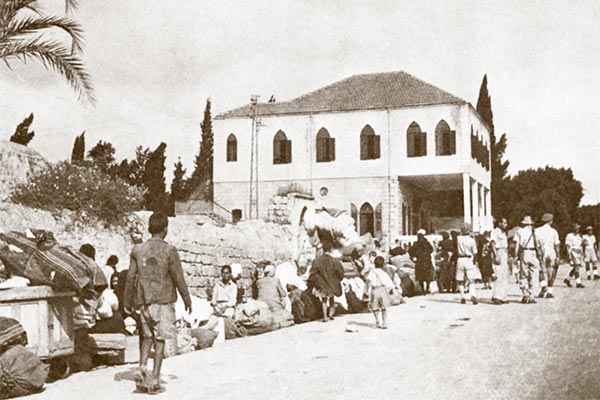Subtotal: $
Checkout
From the foreword to My Search by Josef Ben-Eliezer
On an exceptionally tense day in 1997, I sat in my office at Bethlehem Bible College as violent clashes between Israeli soldiers and Palestinian demonstrators escalated outside. The sound of heavy gunfire and the putrid smell of tear gas seeped in through my window.
But that’s not why my hands trembled as I read a letter I had just opened. I have received countless letters in my lifetime, but this is one of the few I will always remember. In it, a woman named Channah Ben-Eliezer introduced herself as Josef Ben-Eliezer’s daughter and shared some of her father’s story.
As a Jewish child in Germany, Josef Ben-Eliezer experienced the Nazis’ rise to power. His family initially sought refuge in Poland, but was driven out when the Germans arrived. They fled eastward and ended up exiled to Siberia. Josef escaped and eventually came to Palestine, where he joined the brigades fighting to establish a Jewish state. Their goal was to provide a safe haven for the persecuted Jews of Europe.
Full of energy and enthusiasm, Josef found himself fighting with the forces that conquered the Palestinian town of Lydda, my hometown. (In this book, Josef refers to it by its Hebrew name, Lod.) In her letter, Channah briefly described her father’s account of the atrocities committed against the people of Lydda. The events of Lydda remain one of the open wounds in the relationship between Israeli Jews and Palestinians, as the majority of the town’s inhabitants were forced to leave during the 1948 war. While this has been denied by many Israelis, reading about Josef’s experiences confirmed what my father and other family members had told me.

Refugees being expelled from Ramla in July 1948 (Public domain)
For Josef, these events triggered flashbacks of being driven from his own home as a child – and started him on a lifelong spiritual quest for peace. This relentless search eventually led Josef to find the Messiah, Jesus. It also encouraged him to seek reconciliation. First he went to Germany, where he found brotherhood among a people that had committed horrible acts against his own people during the Holocaust. Then he looked for a way to reconcile with the people of Lydda and seek their forgiveness.
Channah’s letter included a request. She wanted to help her father connect with people who had been expelled from their homes in Lydda. At the time, she did not know that I grew up in Lydda, nor did she know my family’s story.
This was a gift I would never have imagined – a man seeking forgiveness for an event that left scars and still very much affects the people of this land. I responded immediately to Josef’s request and arranged for him to meet my father. When Josef came to meet my father, Yacoub, I watched as they walked through the old city of Lydda together, describing to each other their memories of that day in 1948. Then Josef turned to my father and asked his forgiveness. Later my father told me, “I never believed that my story would be acknowledged by a Jew, let alone by someone seeking forgiveness.”
This was a gift I would never have imagined – a man seeking forgiveness for an event that left scars and still very much affects the people of this land.
Some of the most difficult and challenging aspects in reconciliation initiatives between Israelis and Palestinians are history and narrative – what happened in this land, who is at fault, who started what, and how we choose to remember these events. For the Jews, there is the suffering and pain of the Holocaust and the discrimination they faced in the countries where they lived. For the Palestinians, the years 1947 to 1949, known as the Nakba, stand out in our memory, as many were uprooted from their homes and still have no nation to call home. All these events have left major scars. They need to be acknowledged, understood, taken seriously, and addressed.
The story of Josef and Yacoub offers hope for all of us. It shows that once history and narrative are mutually recognized, there is a way forward for Israelis and Palestinians. It will require courage, openness, deep learning from life experiences, and a desire to move forward for the sake of a new generation. But like these two brave men, we too can find freedom and healing through repentance and forgiveness. May their act pave the way for many in our society.
Salim J. Munayer PhD is executive director and founder of Musalaha Ministry of Reconciliation, which has been bringing Israelis and Palestinians together since 1990 and creating a forum for reconciliation. Salim is a Palestinian-Israeli born in Lod. He is adjunct professor at Fuller Theological Seminary and The Hebrew University of Jerusalem.
Already a subscriber? Sign in
Try 3 months of unlimited access. Start your FREE TRIAL today. Cancel anytime.






Heather Peterson
Thank you for writing this. It reminds me that asking God for forgiveness is essential but the acts of forgiveness and reconciliation toward our neighbors are GREAT acts of Love and a way of denying one's self.